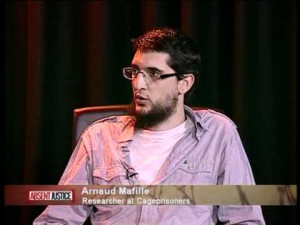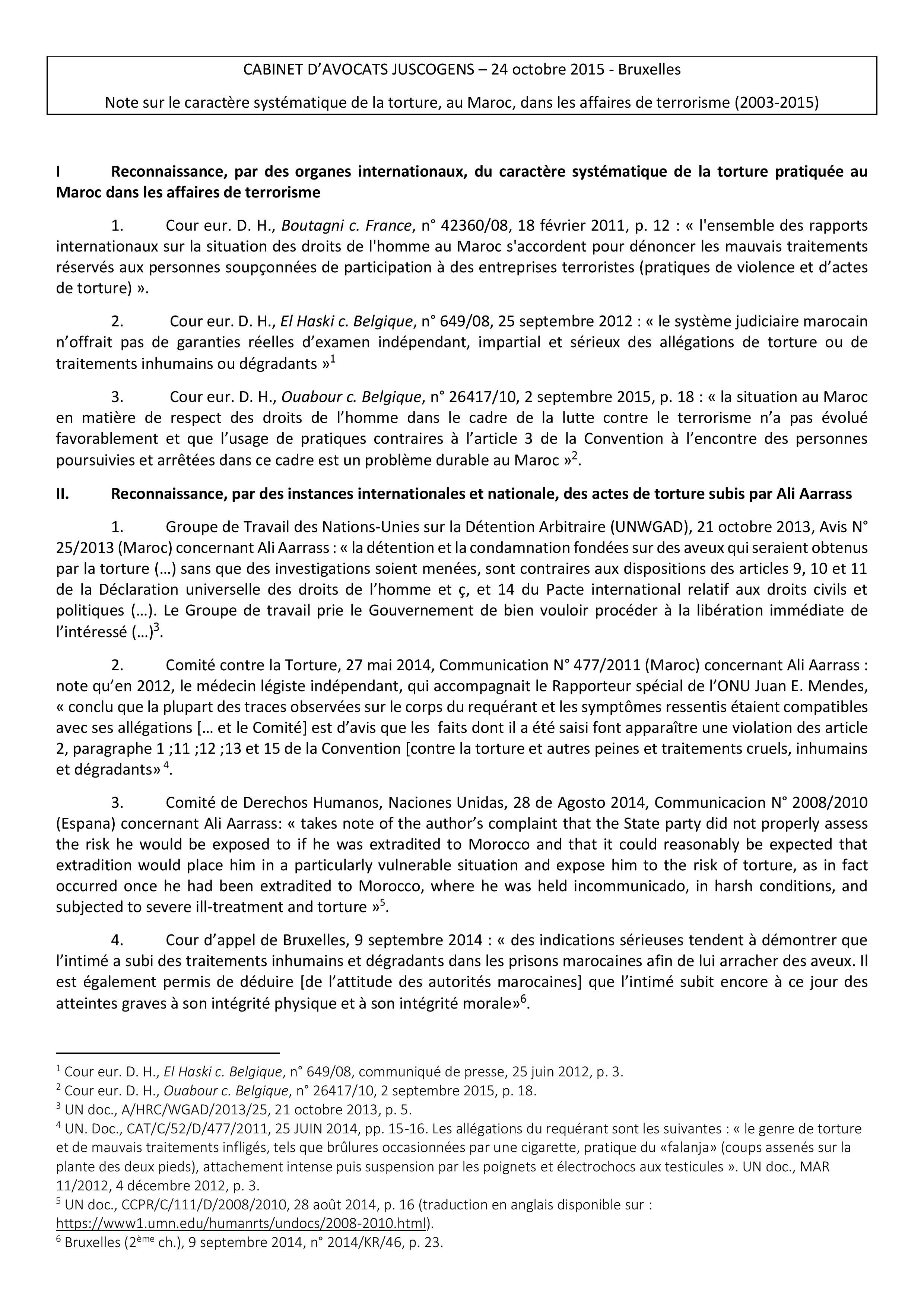Ils fera partie de la délégation internationale au procès d’Ali Aarrass à Rabat (Maroc).
Hij vervoegt de internationale delegatie op het proces van Ali Aarrass in Rabat.
He joins the international delegation at the audience of the Ali Aarrass’ trial in Rabat.
Arnaud Mafille est chercheur francophone pour l’ONG Cageprisoners http://www.cageprisoners.com/ à Londres.
Deux/two articles d’Arnaud Mafille (mars 2012 (fr), August 2012 (English)
L’antiterrorisme français exemplaire selon Fillon ? Les faits prouvent le contraire
Arnaud Mafille
L’institution antiterroriste française était dans l’œil du cyclone depuis quelques temps. Entre l’affaire Tarnac, qui avait donné une voix à ceux qui décriaient la fabrication de la menace terroriste, et les soupçons à l’encontre du juge Bruguière dans l’affaire Karachi, de plus en plus dénonçaient ce droit d’exception qui bien souvent fait exception au droit.
Pourtant, c’est exactement le positionnement inverse que François Fillon a adopté pour défendre les services de renseignement dans l’affaire toulousaine. Selon le premier ministre, c’est en effet le respect des libertés individuelles qui expliqueraient les “ratés” de l’affaire”.
“On n’a pas le droit dans un pays comme le nôtre de surveiller en permanence sans décision de justice quelqu’un qui n’a pas commis de délit (…). Nous vivons dans un État de droit”, a-t-il déclaré au micro de RTL, le 23 mars.
Cette vison idyllique du renseignement ne semble cependant pas correspondre à la réalité française. En tout cas, ce n’est pas celle d’Alain Chouet, ancien chef de la Direction générale de la sécurité extérieure (DGSE). Dans “La sagesse de l’espion” (L’Oeil neuf, 2010), il déclarait sans langue de bois aucune :
“C’est donc ne rien comprendre que d’accuser les services secrets de faire dans l’illégalité. Bien sûr, qu’ils font dans l’illégalité. Ils ne font même que cela. C’est leur vocation et leur raison d’être”.
Pour illustrer ses dires, le même Alain Chouet expliquait comment les services émiratis, “dûment chapitrés par les américains et les français”, avaient kidnappé le français Djamel Beghal et obtenu de lui des aveux en 2001. Même si, après enquête approfondie, les services français avaient été forcés de constater que “Beghal ne disposait en France d’aucune capacité humaine, technique ou financière susceptible de lui permettre de commettre un attentat d’envergure “.
En réalité, pendant les deux mois passés aux Émirats arabes unis, Beghal a dit avoir fait l’objet de sévices sexuels, de privation de sommeil et de lumière, d’arrachages d’ongles, de perçage de dent à vif et de bien d’autres traitements du même acabit. A son retour en France, un examen médical relèvera certaines traces de mauvais traitements dénoncés par Beghal et “un retentissement post-traumatiques aux faits allégués”.
Des pratiques loin d’être exemplaires
Cette affaire n’est malheureusement pas isolée. Human Rights Watch dénoncera également le cas de Said Arif, un ressortissant algérien arrêté et qui disait avoir été torturé par les services secrets syriens en 2003. Un juge d’instruction français avait alors fourni une liste de questions aux autorités syriennes, questions accompagnées de réponses entre parenthèses. Certains avaient parlé d’une délocalisation de la torture par la France en Syrie.
A ces affaires, on pourrait également ajouter, pêle-mêle, les interrogatoires conduits à Guantanamo par les services français ou encore le cas de M’hamed Benyamina arrêté en Algérie sur demande de la France d’après ses défenseurs. Ses aveux obtenus sous la torture seront versés à un dossier français. L’on est assez loin de l’Etat de droit de Monsieur Fillon !
Et le premier ministre de poursuivre : “Le fait d’appartenir à une organisation salafiste n’est pas en soi un délit. Il ne faut pas mélanger le fondamentaliste religieux et le terrorisme”.
Là encore, l’observation de la jurisprudence antiterroriste ne lui donne pas raison. Ainsi, en 2005, Beghal fut condamné à dix ans d’emprisonnement, non pas pour la préparation d’un quelconque attentat mais bel et bien en raison de son appartenance à ce que le premier ministre appelle le “fondamentalisme religieux”, celui qui, d’après le jugement, vise à déstabiliser les pays occidentaux qui soutiennent les USA et Israël.
Quoi qu’il en soit, bien que flatteuse pour les amoureux du pays des Droits de l’Homme, la défense de l’antiterrorisme français proposée par François Fillon ne résiste pas à une analyse rigoureuse des pratiques hexagonales. Et il faut le dire avec force, ces dernières se sont révélées non seulement illégales et immorales mais également contre-productives.
How to successfully complain against erroneous terrorism reporting and counter the false narrative
Written by Arnaud Mafille
“If you’re not careful, the newspapers will have you hating the people who are being oppressed, and loving the people who are doing the oppressing.” Al Hajj Malik el Shabbaz, aka Malcolm X
Muslims suspected of having links with terrorism are often victims of negative and erroneous media portrayals. They often end up being found guilty by the general public even before standing for trial. This article seeks to provide a practical guidance to overcome this issue through a recent example.
In January 2012, the European Court of Human Rights’ decision, that deporting Muslim cleric Abu Qatada to Jordan would violate his right to fair trial created an unprecedented controversy in the United Kingdom. Several outraged politicians and commentators came out attempting to show that Abu Qatada is or was a very senior Al Qaeda figure in Europe. Moazzam Begg has already described and clarified some of the unsubstantiated allegations laid against Abu Qatada. Another accusation levelled against Abu Qatada, widely spread through the media, was that he had influenced Djamel Beghal, a French-Algerian jailed in France, in plotting to blow up the US embassy in Paris.
What was presented as an established fact was actually far from reality. If it is true that Djamel Beghal was sentenced to ten years of prison in France in 2005, the decision of the French Court of appeal explicitly states that there was no evidence whatsoever to suggest that any plan to bomb the US embassy in Paris ever existed:
“As for Djamel Beghal, the Court observes that the evidence of a project to bomb American interests in Paris (embassy or cultural centre) is not reported by the procedure, except through a statement made by Djamel Beghal before Emirati investigators but obtained under conditions incompatible with the right to defence and which can therefore not be used against him. Nevertheless, it appears from the investigation and the instruction that he is implicated in the most radical Islamist sphere, the one supported by Al Qaeda and which aims have been established to be the destabilisation of western regimes that support the US and Israel.”
Moreover, commenting on this case, Alain Chouet, former head of the French intelligence, declared that after a rigorous investigation, his services had to conclude that Beghal did not have the human, technical or financial resources to commit such an attack.
The reality is that the only element pointing towards a plot to blow up the Parisian US embassy was a confession made by Beghal while he was illegally and secretly detained in the UAE. In accordance with International law, the court of Appeal had to dismiss the statements simply because the Beghal was subjected to torture and forced into making false confessions. During a medical examination carried when he returned to France, a doctor found evidence of mistreatment as well as “post-traumatic effect[s] of the alleged events”.
As revealed by Cageprisoners in a report, Beghal alleges that the methods used against him included extremely grave sexual assaults, beatings on the sole of his feet, sound torture, sleep, food and light deprivation, exposure to extreme temperature, stress positions, nail ripping, water torture, injection of unknown chemicals and mock executions.
Finally, a diplomatic cable sent from the US embassy in Paris released by Wikileaks revealed that a French judge declared that the evidence against Beghal would normally not have been sufficient to secure a conviction but the counter-terrorism services were successful because of their reputation.
All the points mentioned above are from open sources easily accessible on the internet. Any interested person could have identified them.
The Beghal/Abu Qatada case is not isolated and the press has repeatedly peddled incomplete, misleading or incorrect information on terrorism-related cases with devastating consequences for the accused who are deemed guilty even before they appear in front of a court. But how does one challenge this? Aren’t the media the ‘fourth estate’? Aren’t newspapers, TV and radio channels owned by multi-billionaires media conglomerates? They may well be but a grain of sand can cause the most sophisticated machine to grind to a halt. Any individual can send a polite email to the editor of any newspaper in order to point out an inaccuracy or a mistake in a media report. It’s possible that one might even be the recipient of gratitude as a result of pointing out the error. If the discussion is not fruitful however, mechanisms such as those on offer by the Press Complaint Commission purportedly exist in order to resolve the dispute and reach common ground.
Indeed this very simple process led the Daily Mail to add a few lines at the end of two articles (here and here) highlighting the points mentioned above as well as the Press Complaint Commission to issue a statement on its website. No matter how small this result might be, it is only when a number of conscious people take those little steps to achieve these “little results” that a narrative closer to the truth will be brought about in this so-called War on Terror.
Notes:
1. See also: Fahad Ansari’s letter on the Abu Qatada case in The Times.
2. For more advice on dealing with similar complaints write to us at contact@cageprisoners.com






